Is there Qur’anic evidence for the descent of Jesus, son of Mary?
The Qur’an clearly affirms that Jesus, son of Mary (ʿĪsā ibn Maryam عليه السلام), was raised up to Allah, that he was not crucified as the Christians claim,
“And [for] their saying, ‘Indeed, we have killed the Messiah, Jesus, the son of Mary, the Messenger of Allah.’ And they did not kill him, nor did they crucify him—but [another] was made to resemble him to them. And indeed, those who differ over it are in doubt about it. They have no knowledge of it except the following of assumption. And they did not kill him, for certain. Rather, Allah raised him to Himself. And ever is Allah Exalted in Might and Wise. And there is none from the People of the Book but that he will surely believe in him before his death. And on the Day of Resurrection, he will be a witness against them.” (al-Nisāʾ 4:157–159)
This final part of this verse has been interpreted by many scholars as meaning that Jesus عليه السلام will descend at the end of time, at which point many among the People of the Book will believe in him.
The Prophet ﷺ also confirmed this in authentic narrations. Abū Hurayrah (may Allah be pleased with him) reported that the Messenger of Allah ﷺ said: “By Him in Whose Hand is my soul, the son of Mary will soon descend among you as a just judge. He will break the cross, kill the swine, abolish the jizyah, and wealth will become so abundant that no one will accept it.” Abū Hurayrah then recited: “And there is none of the People of the Book but will surely believe in him before his death, and on the Day of Resurrection he will be a witness against them” (al-Nisāʾ 4:159). [al-Bukhārī 2222; Muslim 155].
The belief in the return of Jesus, son of Mary (ʿĪsā ibn Maryam عليه السلام), at the end of time is a matter established in the Sunnah and affirmed by the scholars of Islam. Yet, some people cast doubt on this, claiming, “We only believe in what is explicitly in the Qur’an. Show us proof from the Qur’an itself.”
In response to such a claim, let us turn directly to the Qur’an. With an open heart and mind, let us reflect on the verses that allude to the future descent of Jesus (ʿalayhi al-salām).
Sūrat Āl ʿImrān, verses 45–47
Allah Almighty says:
إِذۡ قَالَتِ ٱلۡمَلَـٰٓئِكَةُ يَـٰمَرۡيَمُ إِنَّ ٱللَّهَ يُبَشِّرُكِ بِكَلِمَةٖ مِّنۡهُ ٱسۡمُهُ ٱلۡمَسِيحُ عِيسَى ٱبۡنُ مَرۡيَمَ وَجِيهٗا فِي ٱلدُّنۡيَا وَٱلۡأٓخِرَةِ وَمِنَ ٱلۡمُقَرَّبِينَ ٤٥ وَيُكَلِّمُ ٱلنَّاسَ فِي ٱلۡمَهۡدِ وَكَهۡلٗا وَمِنَ ٱلصَّـٰلِحِينَ ٤٦ قَالَتۡ رَبِّ أَنَّىٰ يَكُونُ لِي وَلَدٞ وَلَمۡ يَمۡسَسۡنِي بَشَرٞۖ قَالَ كَذَٰلِكِ ٱللَّهُ يَخۡلُقُ مَا يَشَآءُۚ إِذَا قَضَىٰٓ أَمۡرٗا فَإِنَّمَا يَقُولُ لَهُۥ كُن فَيَكُونُ ٤٧
“[Remember] when the angels said, ‘O Mary, indeed Allah gives you good tidings of a Word from Him, whose name will be the Messiah, Jesus, the son of Mary—distinguished in this world and the Hereafter and among those brought near [to Allah]. He will speak to the people in the cradle and in maturity, and will be among the righteous.’ She said, ‘My Lord, how will I have a child when no man has touched me?’ [The angel] said, ‘So it is—Allah creates what He wills. When He decrees a matter, He only says to it, “Be,” and it is.’” (Āl ʿImrān 3:45–47).
The Meaning of “He will speak to people in the cradle and in maturity”
The verse means that Jesus (ʿĪsā عليه السلام) would speak to people both as an infant in the cradle and later as a man in maturity.
Middle age refers to the stage between youth and old age, generally between the ages of 34 and 50.
When the angels announced that he would speak in the cradle, this was clearly a miracle and a special blessing granted to him. However, speaking in middle age is something all people naturally do. So what is the significance of mentioning this detail about Jesus (ʿalayhi al-salām)?
Ibn Kathīr, in al-Bidāyah wa’l-Nihāyah, explains that Jesus (ʿalayhi al-salām) was raised up to heaven at the age of 33, according to the well-known view (Ibn Kathīr 1997, 2:115)—just before reaching middle age. From this, we understand that the phrase “in maturity” (كَهۡلٗا) points to his future return to Earth, when he will live and speak to people as a middle-aged man.
Not only that, but the verse states that he will speak to the people.
- One might say: “Of course, it is only natural that he would speak to people.”
- But in reality, it is not so simple. What language did Jesus (ʿĪsā عليه السلام) speak two thousand years ago?
He spoke Aramaic—a language that has almost become extinct, with only a few hundred people in Syria speaking it today, despite the changes it has undergone over two thousand years.
This indicates that when Jesus (ʿalayhi al-salām) descends again, he will be equipped with the languages spoken by people today, foremost among them Arabic. He will be able to address every person in their own tongue, for he is a messenger of Allah to all peoples. He will not need to learn or study these languages; rather, this ability will be a sign from Allah, a miracle granted to our Master Jesus (ʿalayhi al-salām).
Let us now move to Sūrat Maryam and consider its verses. I ask the reader’s permission to refer to these verse endings as “rhymes” figuratively.
We find the sūrah beginning with verses ending in a specific rhyme (Zakariyyā, khafiyyā, shaqiyyā, etc.), continuing in this pattern until verse 33. Then, in verses 34–40, the rhyme changes (yatamturūn, fayaqūl, mustaqīm, etc.). After that, the original rhyme returns in verse 41 (ṣiddīqan nabiyyā), and continues in the same style until the end of the sūrah.
What is the secret behind this interruption of rhyme in the middle of the sūrah?
It is proven in Ṣaḥīḥ Muslim, from the ḥadīth of ʿAbdullāh ibn ʿAmr, that the Messenger of Allah ﷺ said that when Jesus (ʿĪsā عليه السلام) descends from heaven, he will remain on earth for seven years (Muslim, Ṣaḥīḥ, ḥadīth 2940).
Thus, the interruption of rhyme corresponds to the break between two periods: the 33 years in which Jesus (ʿalayhi al-salām) lived his childhood and youth, and the 7 years in which he will live during his return in middle age. Between these two periods lies a long break of more than two thousand years.
As for the duration of his stay on earth after his descent, the authentic hadiths mention two different periods. Some narrations state that he will remain for forty years, while others mention seven years. For example, a narration in Sunan Abī Dāwūd and Musnad Aḥmad mentions that he will live on earth for forty years, after which he will die and the Muslims will perform the funeral prayer for him. On the other hand, Ṣaḥīḥ Muslim records a narration from ʿAbdullāh ibn ʿAmr that after Jesus kills the Dajjāl, the people will live in peace for seven years, with no enmity between any two persons.
The scholars reconciled these reports in several ways. One explanation is that the forty years refers to the total span of Jesus’ life on earth: thirty-three years before he was raised up, and seven years after his descent, completing forty in all, and this explanation suits the Quranic interpretation put forth in this article. Another interpretation is that the seven years in Muslim’s narration refers to the period of peace enjoyed by the people after his death, not the length of his life following his descent. A third view holds that the seven years refer to the period he spends ruling alongside the Mahdī, after which he will remain a further thirty-three years, thus completing forty.
Let us now turn to verse 64 of Sūrat Maryam. You may have noticed the unusual position of this verse.
The verse immediately before it (verse 63) states:
تِلْكَ الْجَنَّةُ الَّتِي نُورِثُ مِنْ عِبَادِنَا مَنْ كَانَ تَقِيًّا ٦٣
“This is Paradise which We give as an inheritance to those of Our servants who were righteous.” (Maryam 19:63)
Here, it is clear that the speaker is Allah Almighty. But right after that, verse 64 says:
وَمَا نَتَنَزَّلُ إِلَّا بِأَمْرِ رَبِّكَ لَهُ مَا بَيْنَ أَيْدِينَا وَمَا خَلْفَنَا وَمَا بَيْنَ ذَٰلِكَ ۚ وَمَا كَانَ رَبُّكَ نَسِيًّا ٦٤
“And We do not descend except by the command of your Lord. To Him belongs what is before us and what is behind us and what is between them. And your Lord is never forgetful.” (Maryam 19:64)
Who is speaking here? Certainly not Allah Almighty.
The reason for the revelation of this verse is given in Ṣaḥīḥ al-Bukhārī: the Messenger of Allah ﷺ asked Jibrīl (Gabriel), “What prevents you from visiting us more often?” Then this verse was revealed: “And We do not descend except by the command of your Lord…” (al-Bukhārī, Ṣaḥīḥ, ḥadīth 4454).
Thus, the speakers in this verse are the angels. Yet, naturally, we would expect the verse to say: “And the angels said, ‘We do not descend except by the command of your Lord.’” So why was the introductory phrase “the angels said” omitted, and their words given directly?
This subtlety carries a deeper meaning: it indicates that it is not only the angels who descend by Allah’s command at the time He decrees, but that others too will descend by His command.
- Like whom?
- Like Jesus, son of Mary (ʿĪsā ibn Maryam عليه السلام).
These are three Qur’anic references, and there are others besides them.
How deeply one would long to see one of Allah’s prophets—to embrace him, to speak with him, to sit by his side, and even to carry a notebook or a gadget in which to record his wise words.
There is also another matter of great importance: to ask him about the differences that have arisen among us in matters of jurisprudence. Throughout the centuries, various schools of Islamic law have held differing views. How blessed it would be to have a prophet among us to inform us of the correct position in these matters.
And who will this be?
It is ʿĪsā ibn Maryam (Jesus, son of Mary, عليه السلام)—one of the resolute messengers (ulū al-ʿazm), the Messenger of Allah, His Word which He bestowed upon Mary, and a spirit from Him. He will purify the earth from the evil of the Antichrist (al-Dajjāl) and the corruption of Gog and Magog (Yaʾjūj wa-Maʾjūj).
Thu, it remains beyond dispute that the certainty of his descent, his role in destroying the Dajjāl, establishing justice, and restoring peace and security on earth—matters confirmed by both the Qur’an and the Sunnah.
About thre author:
Hussein Al-Baidhani, a Yemeni researcher and content writer specializing in Islamic culture, with expertise in ancient Yemeni inscriptions, intellectual articles, and cultural presentations.
Disclaimer
The views expressed in this article are the author’s own and do not necessarily mirror Islamonweb’s editorial stance.

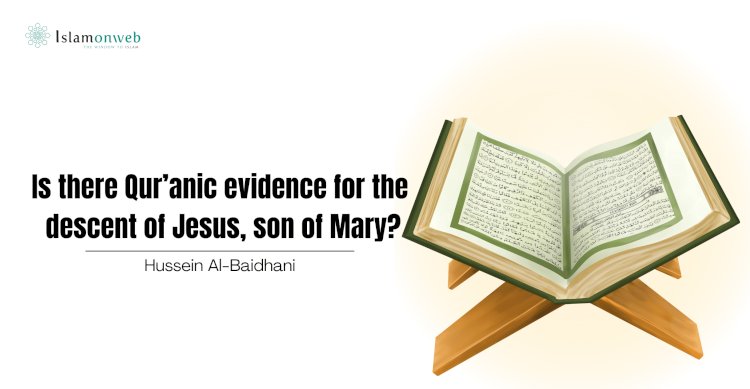


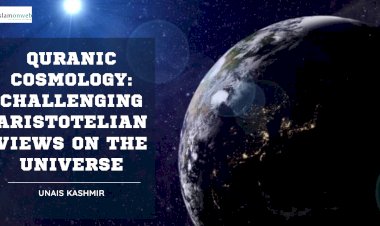

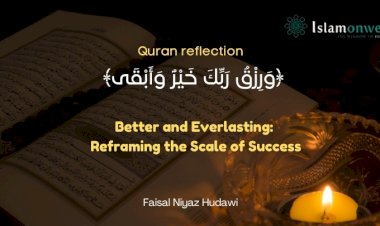

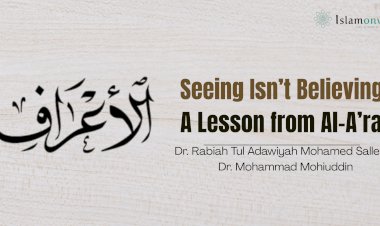
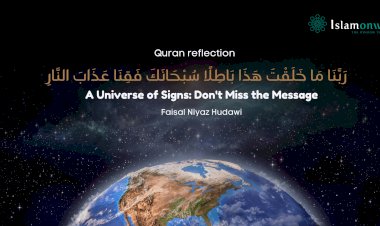














Leave A Comment